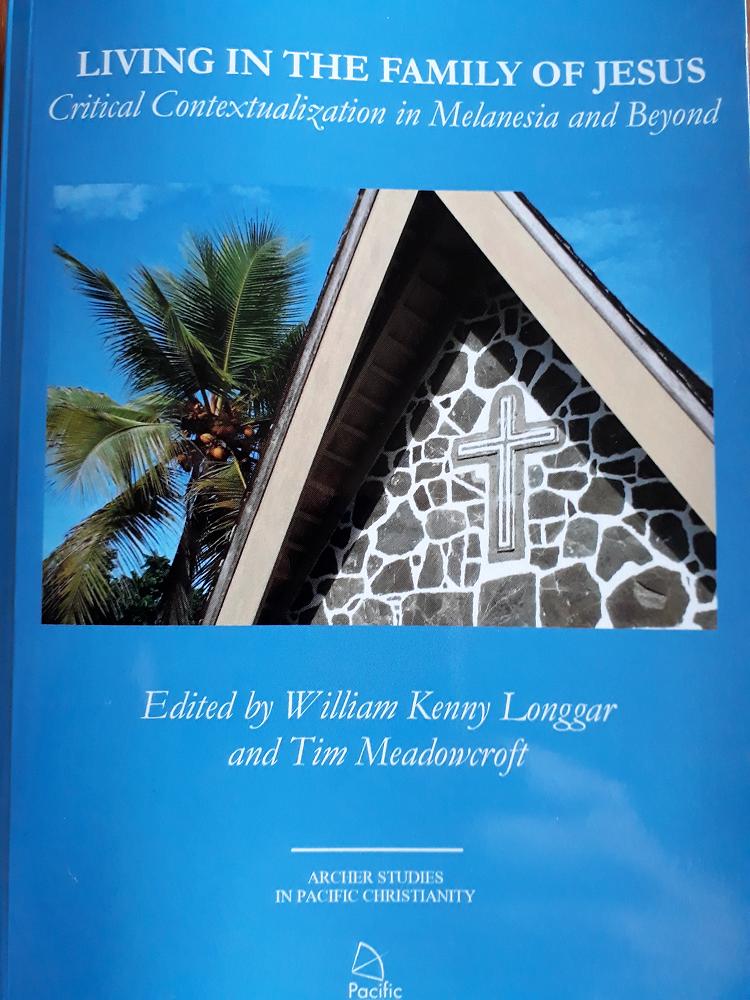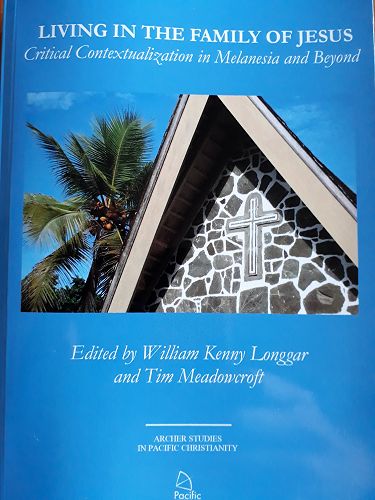
Book Review: Living in the Family of Jesus: Critical Contextualization in Melanesia and Beyond.*
Edited by William Kenny Longgar and Tim Meadowcroft
Dedicated to John Hitchen who, with his wife Ann, has had long involvement in and passion for theological education in Melanesia, this book collects together Melanesian scholars, friends and wider colleagues to “recognise and honour” his work, “reflect from and towards” Melanesia, and make a “localised contribution” to thinking around critical contextualisation (18). The hope in doing so is to enable the Melanesian church to know “she is not alone in her struggles,” and to remind the world church that this often forgotten region has much to offer (19). The resulting work is fascinating, carefully crafted, and of a high scholarly standard. It offers a significant contribution to the field of contextual theology and the discipline of critical contextualisation.
The first six chapters beyond the introduction are written by five Melanesians and one member of the Divine Word Missionaries living there since 2001. William Kenny Longgar begins with a strong call to Melanesian Christians to courageously choose not to borrow theologies but to develop their own so that the message of the scriptures to Melanesians might not be undermined, and disunity and church splintering due to unfamilyer ideas can be avoided. The following chapters exemplify Longgar’s call, proffering theological interpretation from the Melanesian context with Maxon Mani arguing for the ‘wantok’ system as crucial foundation for theology and missiology; George Mombi seeking Jesus as Wapiken, a model of holiness; Geovanne Bustos SVD discussing how Bikman funeral rites can incarnate and affirm the concept of the “word made flesh;” Joseph Damoi reflecting on how in Hebrews 1 description of Jesus meets three key categories for recognised leadership in primal religious communities in Melanesia; and Aaron Hu’aikaba Abia suggesting that a revisiting of traditional beliefs and practice dismissed by missionaries amongst the Rennell Bellona people is needed in order to empower culturally relevant while Christocentric worship. Between them, these scholars provide an intriguing window into issues and possibilities residing within the Melanesian context and inspiration for theologians beyond. Each are committed to deep and biblical engagement with culture.
Four “in-betweener” scholars (to borrow a later phrase from Les Taylor) – “foreigners” with long involvement in Melanesia – then critically “reflect from” their experience, mixing passion with inevitable edges that their status brings. A chapter on the church in Samo wrestles with the disappointment of its loss of relevance beyond establishment and discusses efforts to regenerate contextual expression (Daniel Shaw). John Hitchen then lingers in 1 Timothy finding biblical wisdom for communities torn by divisive teaching. The ease of equating “cultural honour…with the blessing of God” is turned on its head by a reading of Jesus’s teaching in the Sermon on the Mount, alongside reflection on “the implications of a counter-cultural Jesus for Christianity in [honour-shame cultures of] Papua New Guinea” (195) (Scott Charlesworth). And Doug Hanson explores the power and possibility of “narrative interpretation as a tool for contextualising Scripture” (219) amongst Melanesians steeped in story.
In the remainder of the book scholars “reflect towards” Melanesia by implication of the presence of their work in this volume, with firstly five friends and former students of John Hitchen critically engaging a range of topics located in neighbouring countries, and then three colleagues discussing critical contextualisation from a range of stances before Hitchen is given the final response and expresses his humble and wondering gratitude for the dedication.
The history of the committed sacrifice and impact of Polynesian Wesleyan missionaries to Melanesia from the early 1800s on celebrates local mission endeavour (Michael Rynkiewich). Mata Tumu-Makara explores the preparation of the Mitiaro people of the Cook Islands for the Gospel through traditional legends, fatigue with revenge and violence, and a woman’s prophecy, and the struggle and success in building an indigenous church. A call to address conflict embedded in indigenous understanding conversing with scripture is made by Simon Moetara as he examines the Tutu te Puehu model developed by Maori Ngati Paoa leader Glen Tupuhi, which draws from the narrative of Joseph. A discussion of confrontational, liberal identification and mutual transformation responses amongst Christians to ancestor practices in Japan offers important insight for a critical contextual response to this crucial feature of many cultures (Christopher Hill). Les Taylor (a pseudonym) then reflects upon lessons in the movie Avatar for “in-betweeners” committed to sharing life with those of other, particularly, Muslim faith.
The final section begins with John Roxborogh arguing for an honest reclamation of and wrestling with “syncretism” in the work of critical contextualisation. The startling reality of effective critical contextualisation being perceived as perpetrating cultural and religious genocide, and the challenge of human rights law for local and other Christians engaged in mission is raised by John Flett. The contributing chapters end with a call for the exercise of Godly wisdom in the work of contextualisation, drawing upon the experience and example of Daniel and his friends in the Hebrew Scriptures (Tim Meadowcroft).
Detailing this range in the scope of chapters demonstrates the breadth and depth of this book, as well as its clear commitment to Melanesia and critical contextualisation. As such it will be of use and appeal to local theologians, Christians from the Pacific, and members of the global church. Within its pages lie warnings and encouragement, wisdom and celebration. It is a fitting tribute to John Hitchen.
As Hitchen notes, this book demonstrates that contextualisation is “well advanced in our southwest Pacific region” (419) but that it needs a prompt sequel. As acknowledged by Meadowcroft in the introduction the voices of women are noticeably missing from this volume. Further, Melanesian thinking is being grown in postgraduate programs Hitchen and others have been establishing and will need publishing. Yet projects inspire further projects and access to them is crucial for doing so. Already this book is difficult to get hold of locally, though it is now available in Melanesia through publishers on the ground there. How to disseminate it wider across the Pacific so that it can be read and sit proudly on many more bookshelves?
Rosemary Dewerse is the Thornton Blair Research Fellow, Knox Centre for Ministry and Leadership.
*To see the publishing details and ways the book is available please click on the image below
Gallery

